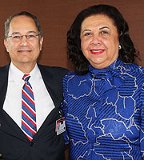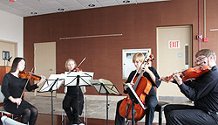MLK Celebration Reflects on Half Century of Change
The celebration began with the sound of a voice. The crowd was silenced by the boom of Dr. Martin Luther King, Jr.’s words in his memorable “I Have a Dream” speech as it resonated within the walls of Hiebert Lounge Jan. 28. Faculty, staff and students from BMC and Boston University’s Medical Campus gathered there to celebrate the life and legacy of Dr. King listened to his speech before the keynote address by Marcelle Willock, MD, former professor and chair, Department of Anesthesiology, BUSM, and former dean, Charles Drew University of Medicine and Science.

Willock reflected on her experience as an African-American woman pursuing a career in medicine during a tumultuous time in United States history.
“For so many of you, 50 years is something in the history books,” she said. “But for a few of us, myself included, we experienced these laws and atrocities or knew people who had.”
Willock said she dreamed of pursuing medicine from an early age. She attended the College of New Rochelle just outside of New York City, where she was informed that getting into medical school would be especially difficult because of her gender and the color of her skin. She was accepted into medical school at Howard University in Washington D.C., a city fraught with segregation and racism at the time.
No sooner had Willock begun her residency in anesthesia at Columbia-Presbyterian Hospital in New York City in 1963, before she asked the chairman of her program for two days off mid-week to attend a protest for civil rights in Washington D.C. The event, it turned out, would be one of the most memorable of her life.
“There were 200,000 people peacefully gathered and united in their purpose to demonstrate nonviolently for civil rights, jobs and freedoms,” she said. “And onto the stage came Martin Luther King, Jr. with his ‘I Have a Dream’ speech. His philosophy of brotherhood projected a better America for all its citizens.”
Willock’s involvement with the civil rights movement and the women’s movement gave her the motivation she needed to overcome the adversity she faced and shaped her career into one that would provide opportunities to minorities in the medical field. Her path brought her to BUSM and BMC, where she became the first minority woman to chair a clinical academic department in the United States.
“My experiences made me more aware of the injustices and the need for me to speak up and push for equality,” she said.
Willock concluded her presentation by imploring the audience to think about their commitment to bettering patient care, and to uphold Dr. King’s dream and BMC’s commitment to exceptional care, without exception.
“We honor Dr. King’s vision for his unselfish commitment to improve the life of all Americans and his observation that our destiny and our freedom as Americans are inextricably bound to each other,” she said.

The presentation was followed by a performance of Antonin Dvorak’s “American Quartet” by a classical string ensemble sponsored by BU College of Fine Arts and Medical Campus Arts Outreach Initiative. A string quartet was chosen because it symbolizes unity — different voices blend together and through teamwork, create harmony.
The annual event was sponsored by BMC’s Events Committee, the BUSM Office of Diversity and Multicultural Affairs, the BU Goldman School of Dental Medicine Office of Diversity, the BU School of Public Health and the BMC Minority Recruitment Program.
Submitted by Sara Cody.